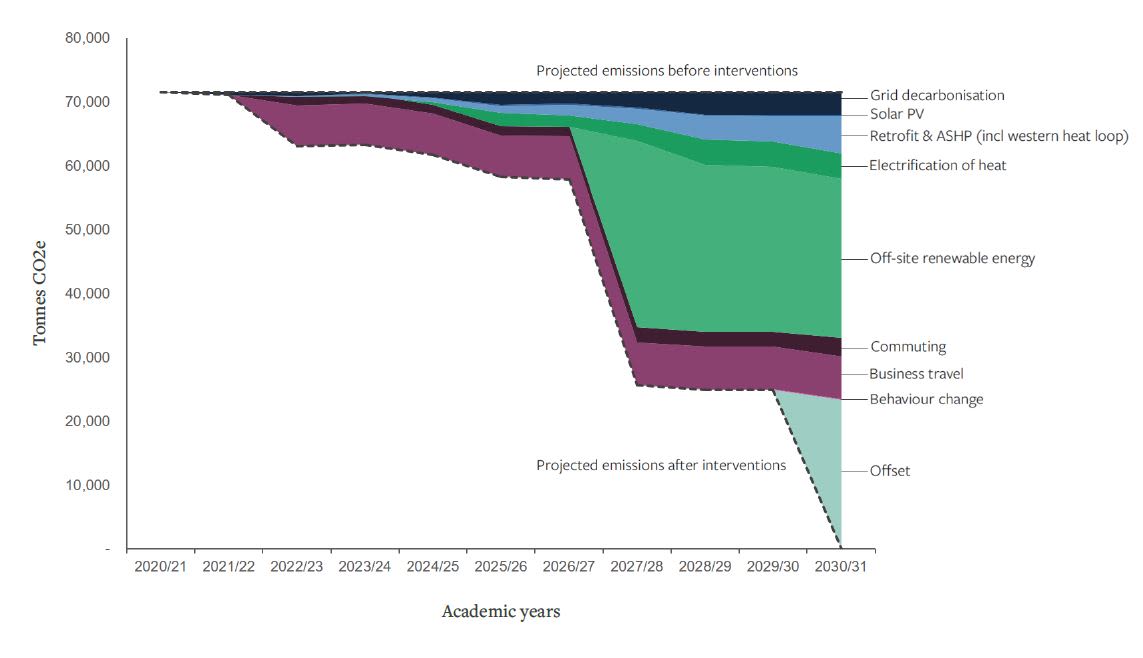Progress against
our objectives

This section details the progress we have made towards delivering our Climate Plan objectives and outlines our upcoming plans.
Delivering Net Zero by 2030

The University’s pathway to delivering net zero emissions by 2030 (PDF) couples demand reduction with interventions to allow decarbonisation of the energy we use. In other words, we are aiming to use less energy and make the energy we do use as ‘green’ as possible.
We are making further emissions reductions through changes to the way we travel, with remaining emissions ‘balanced’ by projects that remove greenhouse gases (GHG) from the atmosphere and verifiable offsets to achieve net zero emissions by 2030. Figure 1 shows the profile and indicative dates of these planned interventions. Read an accessible description of Figure 1 in our companion document (Word).

Figure 1: Planned emissions reductions by intervention (from Pathway to Net Zero Emissions, November 2021)
Figure 1: Planned emissions reductions by intervention (from Pathway to Net Zero Emissions, November 2021)
Ann Allen is Director of Innovation and Campus Development and executive lead for Delivering Net Zero by 2030. She said: “Since joining the University this summer, I have been struck by the passion and dedication of the large team delivering this ambitious target. We should be under no illusions about the challenges ahead of us – overcoming them will require perseverance, innovation, and a willingness to adapt as we navigate the path to net zero.
“As with any project of this size and complexity there are areas where we are ahead of schedule and areas where we are behind, but we have already achieved a huge amount. Importantly, we are on track with the detailed design and review stage, which is a complex and critical element to delivering our future plans effectively.
“I am committed to moving this forward and want to make sure we keep sharing more updates on our progress. I hope everyone who reads this report thinks about their own contributions and, if you think there is anything else we should be doing, please let us know.”
Progress made
The refurbishment of c.70,000 m2 of our estate to reduce energy demand, and prepare buildings for low carbon heating
We have started detailed feasibility studies in 21 of our highest emitting University buildings to assess the opportunities for building retrofit and heat pump installation. This accounts for 160,000 m2. These will be completed in spring 2023 and allow us to create a detailed delivery plan of building interventions. There is a need for this plan to align with our transition to low carbon heat (including the feasibility of geothermal heat) and this might delay the start date of the physical delivery of projects.
Deliver an LED lighting programme across our estate so all buildings have efficient lighting by 2030
We have started to install LED lighting in all university residences and will complete this within two years. We are developing plans to install LED lighting in the remaining buildings with the aim to have completed this well ahead of the 2030 target.
Deliver Better Building Management across the entire estate to reduce energy demand
Improvements to our building and energy controls implemented this year, including changes to the steam heating network and the seasonal closure of buildings, contributed to a 15% decrease in year-on-year emissions over the summer.
This has contributed to a year-on-year reduction in emissions during the spring and summer – albeit a reduction which is outweighed in our annual data due to additional COVID-19 ventilation requirements in late 2021 (you can read more about this in the ‘Emissions reporting’ section of this report).
Looking ahead to the next year, there are more opportunities for efficient use of our estate through better system control and management of our buildings. This will include a more efficient heating, cooling and ventilation policy.
Electrification of heat
We have commissioned a number of feasibility studies to support this transition. These include a detailed analysis of our likely future electricity requirements, a geo-thermal energy study, and surveys to inform the suitability of installing electrode boilers.
The outcome of these and other studies will help develop our detailed delivery plan in spring 2023. We are currently on track with the timeline in the net zero pathway, but there is a risk that widening our scope to include the geo-thermal energy study could slow down decision making.
On- and off-site renewable energy generation
We have completed detailed surveys into the feasibility of installing photovoltaic solar panels on four buildings across the University campus and hope to start installations by the end of 2022.
We have brought forward plans to invest in large-scale off-site renewable energy generation. This will initially cover the grid electricity the University uses, with future expansion planned when we complete the electrification of our heat. We hope to be able to agree specific projects in the coming 12 months to deliver significant emissions reductions ahead of schedule.
Reduce scope 3 supply chain emissions through our Net Zero Plus pathway
We have completed a more detailed baseline assessment of our supply chain emissions using the Environmentally Extended Input Output (EEIO) method. This helped us identify areas to pilot emissions reduction for, including food, IT, and furniture. It will also require us to develop more accurate ways to estimate associated emissions, enabling us to set future reduction targets.
This activity will be delivered in the year ahead, led by a Sustainable Procurement Manager, a new role funded by the Climate Principles Programme.
Explore offsetting opportunities where emissions are unavoidable
We have set up an academic-led working group to develop principles for any necessary offsets and plan to collaborate with the wider university community over the coming year to agree these.
Our plans to plant woodland on University land at Kings Lane (called Gair Wood) are progressing well and we intend to start planting over the winter. You can read more about this in the Cross-cutting priorities section of this report. You can read more about this in the ‘Cross-cutting priorities’ section of this report.
Commission a report into climate resilience on campus to identify potential risks caused from existing and locked in climate change
Climate change is already impacting the UK. Four of the five warmest summers in England have occurred since 2003. The impact of such high temperatures on the UK’s un-adapted infrastructure, coupled with limited investment or commitment to adaptation, have implications on transportation systems and the usability of buildings.
As planned, we have commissioned a report to review risk and prioritise next steps – this will be completed in early 2023, enabling us to develop plans to build climate resilience across the University campus and operations.
Zero direct emissions by 2050
Our commitment to zero direct emissions covers scope 1 and 2 emissions, with the majority of the impact relating to the consumption of electricity and fossil fuels.
Our strategy of the electrification of heat and a direct move away from fossil fuel-supplied energy supports our 2050 target and will be well advanced by 2030, but will require continued investment in property and infrastructure that is not covered by the 2030 investment and pathway. There will be emission sources that are challenging to manage with existing technology (such as refrigerants) and we will need to track research and technology change in these areas to identify opportunities as they emerge.
In addition to zero direct emissions, we are developing a more granular understanding of our supply chain GHG emissions with the aim of setting reductions targets. Due to the complexity of our supply chain this will require active engagement with University buyers, suppliers, the wider higher education sector, other major Leeds employers and academics researching in the field.
We have committed to:
ensure decision-making processes – designed to account for sustainability – factor in no direct carbon emissions by 2050.
We set up the decision-making process within the Climate Principles Programme with a view to achieving zero direct emissions by 2050. However, the decision-making process for broader University planning and project initiation could be improved, to ensure both net-zero and no direct emissions by 2050 are accounted for. We will review this in the coming year.
Achieving sustainable travel

This principle seeks to reduce the impact of business travel and commuting with the aim of reducing and maintaining emissions to 50% of their 2018-19 levels.
Whilst we do not yet have the latest full travel data for the 2021-22 year, the information we do have indicates a reduction in emissions compared to our 2018-19 baseline, reflecting reduced travel during the COVID-19 pandemic. There has been a noticeable increase in travel (especially business travel) following the lifting of pandemic-related restrictions. This poses a challenge to the timeline for delivering our goal.
Professor Selina Stead, Executive Dean of the Faculty of Environment and Climate Principle executive lead for Achieving Sustainable Travel, said: “We appreciate that many issues relating to a sustainable travel policy are complex and there needs to be balanced consideration of the environmental, economic and social impacts of any changes introduced.
“Proactive engagement with staff and students in co-developing the policy is important if we are to gain insights and support from those affected.
“We will ensure engagement with our university community is inclusive and collaborative to help us decide how best to balance actions which can help incentivise ways to reduce emissions along with considerations of equity, health and safety.”
Progress made
Reduce emissions from business travel
We have commissioned Shared Future, a community interest company, to coordinate a panel focused on sustainable travel policy, which will map out how we can reduce business travel emissions effectively and fairly.
It is expected that the panel will present suggested changes to our sustainable travel policy during 2023 . This is behind schedule compared to our original net zero pathway, which projected significant emission reducing interventions to be delivered from August 2022. We have extended the timelines for the panel to ensure its effectiveness and agreed to wait for its findings before making substantive changes to the University’s travel policy. This delay will be reflected in updates to our pathway plan over the coming.
Given this delay, we have published guidance to help staff and students make informed choices about reducing emissions when travelling for business or academic purposes, with a view to incentivising reduced travel emissions.
Reduce emissions from commuting
As we adapt to new ways of working following the COVID-19 pandemic, we must also adapt our approach to co-developing interventions with the University community to reduce emissions from commuting. With this in mind, responses from the annual staff and student travel survey are being collated and analysed with a view to informing how our strategies are implemented.
We have completed a study into electric vehicle charging options, which will inform a campus-wide strategy to encourage lower emitting car travel.
An active travel strategy will be developed over the following year that will aim to remove some of the barriers to walking, running and cycling, through access to more shower and locker facilities and a more joined up approach with the city.
Further activities to reduce travel emissions
We have started to replace the current vehicle fleet with electric vehicles and have expanded the electric fleet to 21 vehicles, from 12 last year.
Providing a sustainable curriculum

This principle commits to providing our students with the knowledge and skills they need to have a positive impact in the world and to contribute solutions in our local community and globally, in an equitable and just way.
We have segmented our Sustainable Curriculum delivery across four focus areas:
- Focus area one: Bringing together and signposting scholarly content and materials that are discipline focused, interdisciplinary and pedagogical for development of curriculum.
- Focus area two: Student-led activity, including projects, dissertations, Leeds Living Labs and additional student volunteering opportunities.
- Focus area three: Simplification and co-coordination of introductory and specialist programmes to allow consistency of provision of sustainability and climate change curriculum.
- Focus area four: Strengthen our existing national leadership.
Professor Jeff Grabill is Deputy Vice-Chancellor: Student Education and executive lead for providing a Sustainable Curriculum. He said:
“The Curriculum Redefined programme is key to both the 2020–30 University Strategy and the embedding of sustainability across our curriculum. Our focus in the first year has been on integrating the existing Sustainable Curriculum programme with Curriculum Redefined, developing the mechanisms and resources to embed sustainability through school-level engagement, and increasing resource to deliver against the four focus areas.
“We have used Climate Plan investment to secure leadership roles for the focus areas and programme management. We will use Curriculum Redefined investment to engage transformative educators in leading task and finish groups aligned to core objectives. With the groundwork in place, we anticipate the delivery of this principle will ramp up as these colleagues get cracking.”
Progress made
Focus area one
We have initiated a Leeds Institute of Teaching Excellence Fellowship to explore and share pedagogy and practice to inform embedding sustainability in the curriculum. We have developed resources for and contributed to the Curriculum Redefined (CR) programme and set up a professional development task and finish group. This is led by a CR Transformative Educator, based in the School of Earth and Environment. It also includes representation from the University’s Organisational Development and Professional Learning service.
We are currently recruiting for further posts and, once fully resourced, we will use the mechanisms we have developed to increase school-level engagement and support, develop the staff professional development programme, and build a suite of resources and case studies for embedding sustainability in the curriculum.
Focus area two
We are currently recruiting for an academic lead for this strand of work. We have secured Leeds University Union representation within the programme’s delivery working group. This will support the recruitment of further student representation across task and finish groups. We have scoped a number of mini projects supporting the principle; the Student Sustainability Architects who will lead on these projects are expected to start in early November.
The Student Sustainability Research Conference – which provides opportunities for students to share their sustainability research in a professional environment – took place in June 2022 and has been expanded for 2023 through collaboration with students from fellow members of the Yorkshire Universities membership organisation.
We have embedded sustainability within the Leeds Skills Matrix, as part of the Career Service-led Surfacing Skills project to integrate core skills across programmes and raise students' awareness of these.
We have initiated the development of new Living Lab projects for this academic year, including a Platinum Jubilee Challenge-winning project led by a University of Leeds PhD researcher to create ‘mini meadows’ on campus for biodiversity and carbon capture.
Focus area three
We recognise that the activity in this this focus area will take longer to develop and will involve collaboration with the University’s Quality Assurance team regarding the Higher Education guidance and regulatory framework, including integrating this guidance into University quality assurance processes.
A new interdisciplinary MSc Climate Futures programme is in the final stages of approval. We have updated and revamped a key Discovery level one module and are making initial plans for an introduction to sustainability digital module. Working with the Curriculum Redefined team, we are developing a new vision for Discovery modules and anticipate that Education for Sustainable Development will be a key element.
Focus area four
The ability to amplify our leadership and influence within the sector is intrinsically linked to our success in the other three focus areas. We have established foundational knowledge exchange networks with peer institutions and co-convened the Environmental Association of Universities and Colleges (EAUC) Living Lab Community of Practice, in partnership with the University of Manchester. We will continue to build on these over the coming year, as well as establishing new opportunities to share learning and approaches.
Reorienting research and teaching

This principle outlines how we will move our research and teaching away from the fossil fuel sector as we transition to a low carbon future. Research and business development managers are supporting reorientation of the research portfolio and the Curriculum Redefined programme is working on reorientation of student education.
Professor Nick Plant, Deputy Vice-Chancellor: Research and Innovation, oversees this principle. He said: “To meet our Climate Principles, it is critical that we reorientate our research and teaching away from extractive fossil fuel technologies and toward sustainable solutions.
“Reorienting research and teaching has focused on investment in developing Geosolutions Leeds, which links academia and industry in research that will underpin future energy generation, storage and consumption, and supporting a Living Lab for Net Zero.
“Recruitment is underway, with roles and projects expected to start early next year, including a professorial lead. Plans for reorientation of teaching are being developed through the Curriculum Redefined programme, including new modules and the closure of the MEng and BEng Petroleum Engineering programme.”
Progress made
Reorienting research: Geosolutions Leeds
In July the University committed to a £2.8 million investment in Geosolutions Leeds reorientation work to fast track its research on geothermal energy as a non-carbon and renewable energy source. This will mainly be through a Subsurface NetZero project starting in early 2023.
The Subsurface NetZero project will bring together research redirected from oil and gas onto solutions that have the potential to deliver geothermal energy to the University, the Leeds region, and beyond. It will ensure Geosolutions Leeds becomes to ‘go-to’ centre for industry, government agencies and local authorities, and UKRI research.
The initial priorities will be to:
- determine the potential for different geothermal technologies, based on assessment of geological conditions and energy demand characteristics
- deliver the baseline data required to address social, risk, and business barriers to adopting geothermal energy
- provide data for living lab assessment; and to support upskilling of the Geoscience community.
Geosolutions Leeds is continuing to establish a growing network group in the School of Earth and Environment and, coordinated with the Low Carbon Futures Institute, to ensure joined-up activity across Reorienting Research, Delivering Net Zero, Supporting a Net Zero City, and Sustainable Curriculum. This includes raising awareness of refocused efforts on the reorientation and understanding the role of earth sciences in net zero.
Geosolutions Leeds has also led the set-up of Joint Industry Projects, which includes a new project focused on offshore wind, with researchers helping to reduce risk and costs through improved siting of wind farms and turbines.
Following the disbanding of the Petroleum Advisory Board, a Geosolutions Advisory Board will be set up in early 2023, to maintain links into the energy sector, support continued engagement with businesses, and help shape the Geosolutions Leeds agenda.
Reorienting teaching
From this year (2022–23), the University has ended its MEng and BEng Petroleum Engineering undergraduate programmes, following a decision taken three years ago.
Plans to develop new MSc modules, to include Carbon Capture Storage and Geothermal, are being developed for delivery within the Curriculum Redefined programme.
Supporting a Net Zero city

This principle recognises the role the University, as a large employer in Leeds, will play in the wider city region, and that helping the city find pathways to reduce emissions will also help bolster our own net zero plans.
It sets out our intent to continue working with Leeds City Council – in particular through Leeds Climate Commission – to support its ambition to become carbon neutral by 2030, alongside working with Yorkshire and Humber Climate Commission to guide ambitious climate action across the region.
The University has approved a £3.3m budget to boost the existing resource and capability needed to support the work of both climate commissions up until April 2024. The funding will also support widening our collaborative partnerships, including extending work on the Living Lab and Positive Impact Partnerships (PiPs) to 2030.
Progress made
We will continue to support both Leeds Climate Commission and Yorkshire and Humber Climate Commission through a range of activities, including collaboration with Living Lab initiatives, Positive Impact Partnerships, the Climate Action Network and Policy Leeds.
The University is one of the founding partners of Leeds Climate Commission. Our investment has enabled work to support the development of engagement and educational activities to progress with both climate commissions. We have recruited four additional roles – primarily focused on engagement and impact – to the commissions’ joint secretariat. This is based in the School of Earth and Environment and will help to deliver phase one of the Yorkshire and Humber Climate Commission’s action plan.
We are working with Yorkshire and Humber Climate Commission to launch a Climate Action Pledge for businesses and organisations at the Yorkshire Climate Summit in November 2022 at the Royal Armouries in Leeds.
We will then:
- support a wide range of businesses and organisations to take meaningful action towards net zero; on climate adaptation; on enhancing nature and biodiversity and on achieving a just transition
- support Yorkshire and Humber Climate Commission’s State of the Region Report, due in April 2024
- work with the climate commissions to review and prioritise potential Living Lab projects and Positive Impact Partnerships
Funding for Supporting a Net Zero City includes about £85k a year for smaller-scale activity that aligns with our Climate Plan. To date, £32k has partially funded the appointment of a City Plan Lead for 37 months, to conduct research and analysis, develop policy insights and support the logistics of a City Plan within Climate Action Leeds, a National Lottery-funded programme providing a platform for Leeds communities and organisations taking action towards a zero carbon, nature-friendly and socially just city.
A steering group led by the Deputy Vice-Chancellor: Research and Innovation will oversee further awards of funding from this budget. The group will also act as a gateway for future business cases escalated to the Climate Principles Programme Board.
We will extend our Living Lab Programme to help solve some of the challenges the city and region faces, collaborating on delivering shared solutions that support an equitable and resilient response to the climate crisis.
We are currently recruiting for three additional posts that will support the extension of the University’s Living Lab and Positive Impact Partnership initiatives to 2030. The recruitment process is expected to complete by January 2023 and will enable the Sustainability service to identify and assess new projects including the feasibility of applying the Living Lab model at a city-wide scale. However, there is a risk that delays to recruitment may lead to delivery taking place later than initially planned.
We have also set up a proof of concept for a City Living Lab project with Leeds Beckett University, Leeds City Council and Nexus. This concept was presented at the Digital Twin Consortium Meeting in September 2022. The second phase, with a focus on air quality and green space, is taking place from October to December 2022, followed by a review and identification of next steps.
We have initiated further Living Lab Projects in collaboration with colleagues working across the Climate Principles, including Gair Wood (a new woodland in north Leeds), research projects at the University Farm, and exploration of the potential for geothermal heat on campus. We will complete the refinement of processes to identify, promote and fund Living Lab solutions to mutual sustainability challenges (internally and externally) early in 2023.
Shaping institutional decision making

This principle committed the University to ensuring that sustainability – and in particular our trajectory towards net zero emissions – is considered within institutional decision-making processes. It set out that we would develop a sustainability value assessment to inform all major decisions, using a similar approach to that already used for risk assessment.
Jennifer Sewel, University Secretary and executive lead for this principle, said: “Delivering our Climate Plan is reliant on the many business decisions we make each day. To support delivering our commitments, we have developed an environmental value assessment and agreed the decision-making boards that will use it.
“The guidance on use of the assessment tool has been shared with colleagues alongside a programme of briefing sessions throughout October 2022.
“The environmental value assessment tool will be used by the boards from the end of 2022.”
Enabling responsible investment

Our Climate Plan reaffirms and strengthens our commitment to investing responsibly.
Jane Madeley, the University’s Chief Financial Officer and executive lead for this principle, said: “The University operates a Climate Active investment strategy, which has meant that since 2019 we have had no shareholding in any company whose primary business is the extraction of fossil fuel, or which derives significant revenue from such extraction.
“During 2022 we have also agreed to make a further move to the ‘Tomorrow’s World’ (TW) strategy as a logical and progressive next step; when fully implemented we will be only investing in companies that are already fit for the future and in bonds which support sustainable social and economic development.”
Working in partnership with the University’s investment manager, Sarasin & Partners, we will move to a ‘Tomorrow’s World’ (TW) investment strategy.
The Tomorrow’s World strategy improves on our current portfolio by investing in companies that support sustainable social and economic development. We have completed the detailed modelling of proposed changes to the investment strategy, and the approach was approved by the University Council in March 2022.
We had planned to move to the new strategy over the summer, but this was delayed due to market volatility and economic uncertainty.
Previous section: 1) Governance and setting up the delivery programme